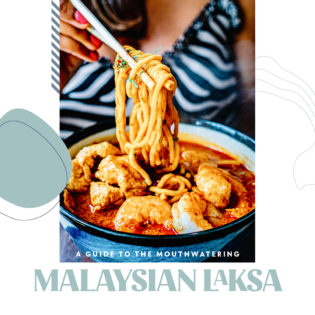Putting fun into food, Chef Jet Lo serves new creations based on old favourites

Trying to decipher and imagine what your dish might look like at Duddha is almost as fun as actually eating these culinary delights cooked up by chef Jet Lo at his “all-day eating-house”. Based on familiar, everyday dishes you might have grown up with, Lo takes these traditional staples and turns them upside down and inside out. In one word: deconstructed.
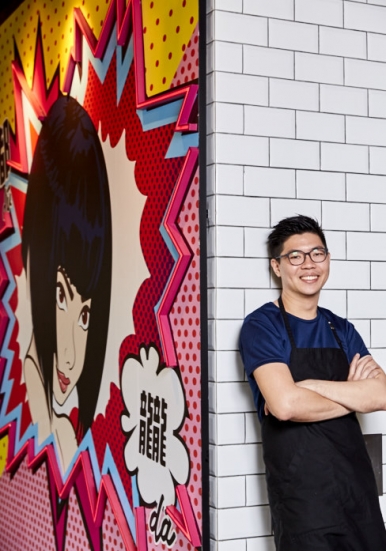
Growing up in a family deeply rooted in the food and restaurant business on both sides, Lo had an early start when he used to wait tables at his parents’ coffee shop, Fook Yuen. These days, Fook Yuen is a flourishing chain of restaurants, mostly in Malaysia’s eastern Sabah state, but is also expanding to newer markets.
Ironically, chef Jet Lo was never that interested in learning how to cook the Chinese and Asian cuisine served at Fook Yuen; his cooking pursuits mostly focused on Western cuisine. After graduating from a culinary academy in Switzerland, Lo moved to Singapore where he eventually found himself working for noted chef Ryan Clift of Tippling Club, a consistent name in the annual Asia’s 50 Best Restaurants list.
Clift later tipped Lo to be Head Chef at Ding Dong, a Singaporean eatery serving modern Southeast Asian dishes. The appointment saw Lo taking one year to study, research and travel around Southeast Asia to better understand the myriad dishes and flavours of the region before creating his new menu for the establishment.
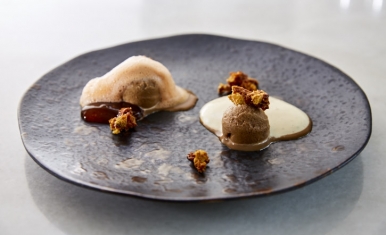
Lo’s efforts paid off as Ding Dong earned plenty of rave reviews, including being named Best Restaurant by a luxury lifestyle magazine in Singapore, putting it on par with Tippling Club. The young chef was also picked to represent Singapore at the Omnivore World Tour Shanghai in 2015 as well as at the San Sebastian Gastronomika 2015, one of the world’s leading annual gastronomy congresses. All this at the tender age of 27.
So how did he end up serving reconstructed Asian food at a restaurant in the tallest twin towers in the world? It was at an event with chef Christian Bauer of Troika Sky Dining when Lo was approached by a restaurateur to helm the upcoming Duddha, taking over the space that was The Apartment at Suria KLCC at the Petronas Twin Towers. Lo resisted at first, but after due consideration thought that it would be good to bring his concept to Malaysia.
At Duddha, where the interiors that are mostly modern with an Asian twist fully complement the Asian-with-a-modern-twist menu, Lo hopes that local diners will learn to shift to new dishes when dining out, instead of the usual noodles, fried rice and soups.
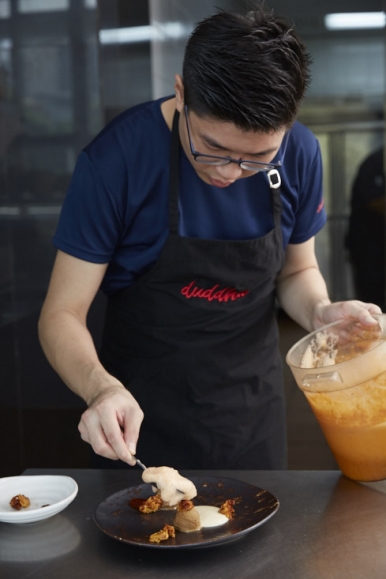
“I was a bit disappointed with the food culture here, where it seems that diners are unwilling to try something new,” Lo laments. “Even with a modern menu, people would rather it never be revamped. The crowd still wants to see the old menu.”
Lo takes it in stride, however, and motivates himself to keep producing exciting dishes of high quality to entice patrons into trying and appreciating new kinds of food.
One way he does this is by making everything from scratch, using ingredients as fresh as possible. “You can find many fresh ingredients in Malaysia, but these are not fully utilised,” he remarks. For Lo, though, this is definitely a plus point for his dishes.
To help keep things familiar to his customers, much like in the movie Ratatouille, Lo draws upon his favourite food as a child when deciding on and creating menu items. For example, his Deconstructed Tofu with oyster sauce, house-made chicken floss, pickled cabbage, garlic and daikon water is a shout-out to the business run by his mother’s side of the family supplying tofu to restaurants.
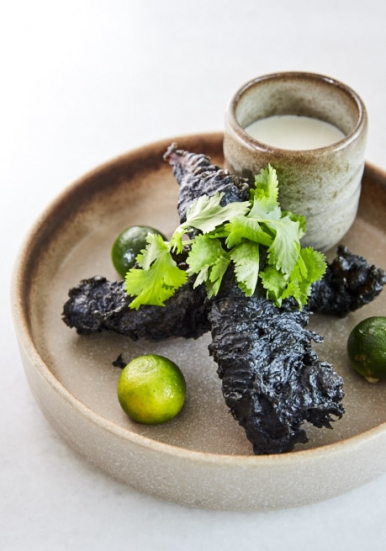
Meanwhile, the Wagyu Beef Char Siew with pickled papaya, house-made chilli sauce and charred spring onions is his ode to the original char siew (barbecued pork belly), of which he has perfected the recipe, making the beef taste exactly like the char siew of his childhood.
Another aspect in which Lo’s dishes differ from the usual Asian fare here is that they are not as spicy as one would expect. “I wanted people to be able to taste all the flavours in the dish, and not just the spiciness,” he explains.
To keep the dishes as flavourful as possible, everything is prepared using traditional ways of cooking with a twist added, employing modern techniques that elevate the dish until the desired outcome is reached. It is imperative to Lo that the balance of flavours is maintained in each dish.
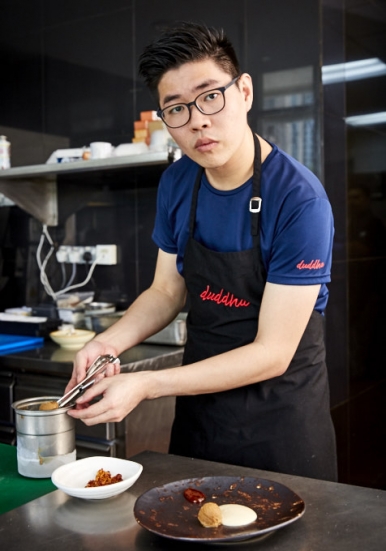
“I won’t be stubborn and force people to like my dishes,” says Lo, “but I want diners to try our food first before saying anything.” Lo says he accepts feedback and will endeavour to fine-tune the recipes until Duddha receives zero complaints, because ultimately, he wants his patrons to be happy. “But while still keeping to my idea,” adds Lo.
It’s a delicate balance that the young chef needs to maintain, between the old and the new, the familiar and the exciting, between his wants and those of his customers, but he enjoys the stress, calling it a motivator that pushes him forward.
Lo even gives his staff a chance to create their own food – an unlikely source of new menu items at most restaurants, but Lo sees this as the fun part about being a leader. He explains that when he was at Ding Dong, they hired hearing-impaired chefs as part of the kitchen crew, and in turn, he learnt a lot from them.






